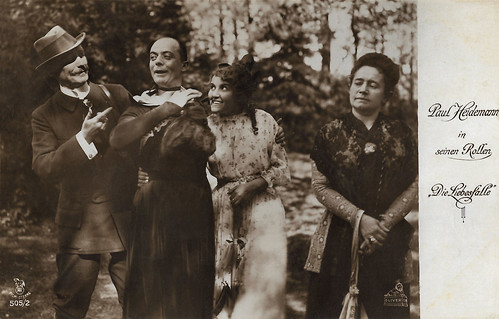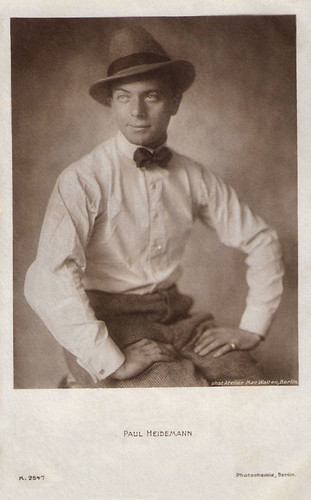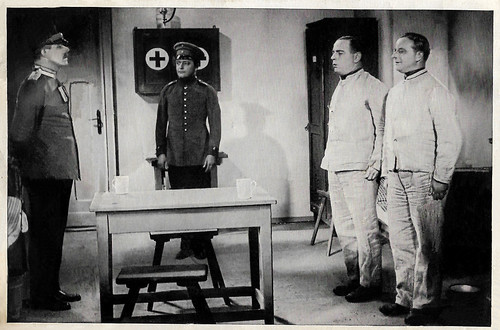German stage and screen actor Paul Heidemann (1884-1968) was also a film director and producer. In the silent period, he was famous for his character Teddy and his other comical parts. He also played many supporting roles in sound comedies.

German postcard by Verlag Hermann Leiser, Berlin-Wilm., no. 5233. Photo: R. Dührkoop.

German postcard by Verlag Hermann Leiser, Berlin-Wilm., no. 5234. Photo: R. Dührkoop.

German postcard by Rotophot in the Film Sterne series, no. 505/1. Photo: Oliver-Film. Paul Heidemann in Die Liebesfalle/The Love Trap (N.N., 1917).

German postcard by Rotophot in the Film Sterne series, no. 505/2. Photo: Oliver-Film. Paul Heidemann in Die Liebesfalle/The Love Trap (N.N., 1917).

German postcard by Verlag Hans Dursthoff, Berlin, no. 1639. Photo: Ufa. Paul Heidemann in Der behexte Neptun/The Bewitched Neptune (Willi Achsel, 1925).
Paul Heidemann was born in Cologne, Germany in 1884. After an initial career in the tobacco branch, he took acting lessons from the Meiningen based court actor Leopold Teller.
In 1906 he debuted in Hanau as Prince Karl-Heinz in the operetta 'Alt-Heidelberg' (Old Heidelberg). In 1909, he joined the theatre of Breslau, where he sang in Bruno Granichstaedten’s operetta 'Bub oder Mädel' (Boy or Girl). Here Heidemann created his reputation as talented comedian. On the recommendation of composer Jean Gilbert, he moved to Berlin in 1911, where he debuted in Gilbert’s play 'Die keusche Susanne' (The chaste Susanne).
Franz Porten discovered Heidemann for the cinema, where he played his first lead in Das Brandmal ihrer Vergangenheit/The Stigma of Her Past (1912). It was followed by films such as Das Teufelsloch/The Devil's Hole (Rudolf Del Zopp, 1913), and Vater und Sohn/Father and Son (Afred Halm, 1914) with Leopoldine Konstantin.
From 1913 to 1915 he also played the character Teddy in countless comical shorts, such as Teddy ist herzkrank/Teddy has a heart condition (1914), Teddys Geburtstagsgeschenk/Teddy's Birthday Present (1915) and Teddy züchtet Notkartoffeln/Teddy Breeds Emergency Potatoes (1915). Sometimes he directed these films as well.
Between 1919 and 1923 Heidemann had his own production company, Paul Heidemann-Film GmbH in Berlin, where he played the lead in films initially mostly directed by Erich Schönefelder and later on rather by Georg Schubert or by Heidemann himself. A late example is Eine kleine Freundin braucht ein jeder Mann/Every man Needs A little Friend (Paul Heidemann, 1927), starring Heidemann but also Julius Falkenstein, Hans Albers, Siegfried Arno and Charlotte Ander.


German postcard by Verlag Hermann Leiser, Berlin-Wilm., no. 5233. Photo: R. Dührkoop.

German postcard by Verlag Hermann Leiser, Berlin-Wilm., no. 5234. Photo: R. Dührkoop.

German postcard by Rotophot in the Film Sterne series, no. 505/1. Photo: Oliver-Film. Paul Heidemann in Die Liebesfalle/The Love Trap (N.N., 1917).

German postcard by Rotophot in the Film Sterne series, no. 505/2. Photo: Oliver-Film. Paul Heidemann in Die Liebesfalle/The Love Trap (N.N., 1917).

German postcard by Verlag Hans Dursthoff, Berlin, no. 1639. Photo: Ufa. Paul Heidemann in Der behexte Neptun/The Bewitched Neptune (Willi Achsel, 1925).
Talented comedian
Paul Heidemann was born in Cologne, Germany in 1884. After an initial career in the tobacco branch, he took acting lessons from the Meiningen based court actor Leopold Teller.
In 1906 he debuted in Hanau as Prince Karl-Heinz in the operetta 'Alt-Heidelberg' (Old Heidelberg). In 1909, he joined the theatre of Breslau, where he sang in Bruno Granichstaedten’s operetta 'Bub oder Mädel' (Boy or Girl). Here Heidemann created his reputation as talented comedian. On the recommendation of composer Jean Gilbert, he moved to Berlin in 1911, where he debuted in Gilbert’s play 'Die keusche Susanne' (The chaste Susanne).
Franz Porten discovered Heidemann for the cinema, where he played his first lead in Das Brandmal ihrer Vergangenheit/The Stigma of Her Past (1912). It was followed by films such as Das Teufelsloch/The Devil's Hole (Rudolf Del Zopp, 1913), and Vater und Sohn/Father and Son (Afred Halm, 1914) with Leopoldine Konstantin.
From 1913 to 1915 he also played the character Teddy in countless comical shorts, such as Teddy ist herzkrank/Teddy has a heart condition (1914), Teddys Geburtstagsgeschenk/Teddy's Birthday Present (1915) and Teddy züchtet Notkartoffeln/Teddy Breeds Emergency Potatoes (1915). Sometimes he directed these films as well.
Between 1919 and 1923 Heidemann had his own production company, Paul Heidemann-Film GmbH in Berlin, where he played the lead in films initially mostly directed by Erich Schönefelder and later on rather by Georg Schubert or by Heidemann himself. A late example is Eine kleine Freundin braucht ein jeder Mann/Every man Needs A little Friend (Paul Heidemann, 1927), starring Heidemann but also Julius Falkenstein, Hans Albers, Siegfried Arno and Charlotte Ander.

German postcard by Rotophot in the Film Sterne series, no. 124/1. Photo: Nicola Perscheid, Berlin.

German postcard by Rotophot in the Film Sterne series, no. 124/2. Photo: Nicola Perscheid, Berlin.

German postcard by Rotophot in the Film Sterne series, no. 124/3. Photo: Nicola Perscheid, Berlin.

German postcard by Rotophot in the Film Sterne series, no. 124/4. Photo: Nicola Perscheid, Berlin.

German postcard by Rotophot in the Film Sterne series, no. 124/5. Photo: Nicola Perscheid, Berlin.

German postcard by Rotophot in the Film Sterne series, no. 124/6. Photo: Nicola Perscheid, Berlin.
Military comedies
In the 1920s, Paul Heidemann became an important supporting actor and sometimes leading man in all kinds of films. He had a supporting part in the silent comedy classic Die Bergkatze/The Wild Cat (Ernst Lubitsch, 1921) featuring Pola Negri as a wild mountain girl and bandit’s daughter.
Heidemann played the lead in the silent historical comedy Der kleine Napoleon/The Little Napoleon (Georg Jacoby, 1923). It depicts the life and amorous adventures of Jérôme Bonaparte, the younger brother of Napoleon (Egon von Hagen), who installed him as King of Westphalia. The film also marked Marlene Dietrich's film debut and was made by the European Film Alliance, a failed attempt by the American studio Paramount to establish a production base in the lucrative German market. The EFA was wound up shortly after the film's completion, which delayed its release. It finally premièred on 29 November 1923 at the legendary Berlin movie palace Marmorhaus.
He often played in comedies, such Der Sprung ins Leben/Leap Into Life (Johannes Guter, 1923) with Xenia Desni, Das süsse Mädel/The Sweet Girl (Manfred Noa, 1926) with Mary Nolan (in Germany known as Imogene Robertson) and Mary Parker, Die dritte Eskadron/The Third Squadron (Carl Wilhelm, 1926) with Claire Rommer, Flucht aus der Hölle/Escape from Hell (Georg Asagaroff, 1928) with Heidemann, Jean Murat and Agnes Esterhazy, and Flucht vor der Liebe/The Flight From Love (Hans Behrendt, 1930) with Jenny Jugo and Enrico Benfer.
Heidemann acted often as sidekick of the popular actor Hans Albers, such as in Der lachende Ehemann/The Laughing Husband (Rudolf Walther-Fein, Rudolf Dworsky, 1926) and the crime drama Hans in allen Gassen/Hans of all trades (Carl Froelich, 1930).
Other silent films, in which Heidemann played supporting parts were the drama Die Geliebte/The Mistress (Robert Wiene, 1927) with Harry Liedtke, and Unter der Laterne/Under the Lantern (Gerhard Lamprecht, 1928) starring Lissi Arna. And he played the lead in the silent drama Der Zigeunerprimas/The Gypsy Chief (Carl Wilhelm, 1929). Simultaneously Heidemann acted on the Berlin stages, mainly in Operettas.

German postcard by Photochemie, Berlin, no. K. 154. Photo: Alex Binder, Berlin.

German postcard by Photochemie, Berlin, no. K. 156. Photo: Alex Binder, Berlin.

German postcard by Photochemie, Berlin, no. K. 157. Photo: Alex Binder, Berlin.

German postcard by Photochemie, Berlin, no. K. 2547. Photo: Atelier Mac Walten, Berlin.

German postcard by Photochemie, Berlin, no. K. 2550. Photo: Atelier Mac Walten, Berlin.

German postcard by Photochemie, Berlin, no. K. 2551. Photo: Atelier Mac Walten, Berlin.
Sidekick
After the introduction of sound film, Paul Heidemann continued to appear in supporting parts in many German films. An example is the comedy Pension Schöller (Georg Jacoby, 1930) starring Paul Henckels and Elga Brink. It is an adaptation of the 1890 play 'Pension Schöller' by Wilhelm Jacoby and Carl Laufs. Georg Jacoby was Wilhelm's son, and made three film adaptation of his father's best known play in 1930, 1952 and 1960. Heidemann played the following year in the romantic comedy Ihre Hoheit befiehlt/Her Grace Commands (Hanns Schwarz, 1931) about a hairdresser (Käthe von Nagy) and a greengrocer (Willy Fritsch) who fall in love and conceal from each other the truth that they are really a Princess and an army officer in disguise.
When in the early 1930s military comedies were popular, Heidemann acted in various military farces such as Wenn die Soldaten.../When the soldiers... (Luise & Jakob Fleck, 1931) with Otto Wallburg, Schön ist die Manöverzeit/Manoeuver Time Is Fine (Erich Schönfelder, 1931) with Ida Wüst, Die Mutter der Kompanie/The Company's Mother (Franz Seitz senior, 1931), Drei von der Kavallerie/Number Three Cavalryman (Carl Boese, 1932) with Paul Hörbiger and Fritz Kampers, and Liebe in Uniform/Love in Uniform (Georg Jacoby, 1932).
Among his most well-known productions are Der tolle Bomberg/The Mad Bomberg (Georg Asagaroff, 1932) with Heidemann in the lead, Ganovenehre/Crook's Honour (Richard Oswald, 1932) with Fritz Kampers, Paprika (Carl Boese, 1932) with Franciska Gaál, Narren im Schnee/Fools in the Snow (Hans Deppe, 1939) with Anny Ondra, and Schneider Wibbel/Tailor Wibbel (Viktor de Kowa, 1939) with Erich Ponto.
During the Second World War, Heidemann worked again as film director. He staged film comedies, such as Mein Mann darf es nicht wissen/My husband must not know (1940) with Mady Rahl, Krach im Vorderhaus/Noise in the front house (1941) again with Rahl, Weisse Wäsche/White laundry (1942) with Harald Paulsen, and Floh im Ohr/Flea in Her Ear (1943), even if the films were not huge hits.
In the 1950s, he acted both in BRD and DDR films. In East-Germany he played Presskopp in the old Berlin farce Ein Polterabend/A Stag Night (Curt Bois, 1955) and the mayor in Bärenburger Schnurre/Bärenburg Farce (Ralf Kirsten, 1957). He also acted in West-German films like Torreani (Gustav Fröhlich, 1951), Der keusche Josef/The Chaste Joseph (Carl Boese, 1953), Rittmeister Wronski/Cavalry Captain Wronski (Ulrich Erfurth, 1954), Der Mustergatte/The Model Husband (Erik Ode, 1956) and Jede Nacht in einem anderen Bett/Every Night in a Different Bed (Paul Verhoeven, 1957). Paul Heidemann died in Berlin in 1968. He was 83.

German postcard by Ross Verlag, Berlin, no. 1142/1, 1927-1928. Photo: Ernst Sandau, Berlin.

With Hans Albers. Austrian Postcard by Iris Verlag, no. 6699. Photo: Lux Film Verleih.

German postcard by Ross Verlag, no. 1101/1, 1927-1928. Photo: Alex Binder, Berlin.

Vintage postcard.

German postcard. Photo: Cicero Film / Distribution Deutsche Tonfilme. The 'fine fleur' of late silent German cinema stars, united for a photo for an early sound film company. Standing left to right: Francis/Franz Lederer, Walter Rilla, Theodor Loos, Camilla Horn, Fritz Rasp and Walter Janssen, Sitting left to right: Paul Heidemann, Charlotte Susa, Betty Amann, Olga Tschechowa, Maria Paudler and Jack Trevor. Might be publicity for the early sound comedy Die grosse Sehnsucht/The Great Longing (Stefan Szekely/Steve Sekely, 1930), in which all acted, mostly as themselves - only Loos and Horn played characters. The plot was an excuse for 35 stars to debut in a talking picture.

German postcard by Ross Verlag, no. 4181/1, 1929-1930. Photo: Alex Binder, Berlin.

German postcard by Ross Verlag, Berlin, no. 6123/1, 1931-1932. Photo: Ufa. Paul Heidemann in Dienst ist Dienst/Duty is Duty (Carl Boese, 1931).

German collectors card in the series 'Vom Werden deutscher Filmkunst - Der Tonfilm', album no. 11, picture no. 139, group 44. Photo: Ufa / Ross Verlag. Fritz Schulz and Paul Heidemann in Dienst ist Dienst/Duty is Duty (Carl Boese, 1931).

German postcard by Ross Verlag, Berlin, no. 7273/1, 1932-1933. Photo: Renaissance-Film. Paul Heidemann possibly in Annemarie, die Braut der Kompanie/Annemarie, the Bride of the Company (Carl Boese, 1932).

German postcard by Ross Verlag, no. 8154/1, 1933-1934.

East-German postcard by VEB-Progress Film-Vertrieb, Berlin, no. 176-59. Photo: Defa-Neufeld. Publicity still for Junges Gemüse/Young Vegetables (Günter Reisch, 1956).
Sources: Thomas Staedeli (Cyranos), Volker Wachter (Defa Sternstunden - now defunct), Filmportal.de, Wikipedia (German) and IMDb.
No comments:
Post a Comment